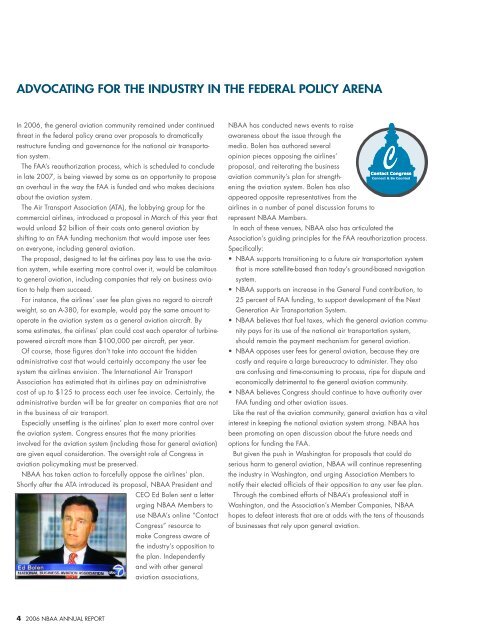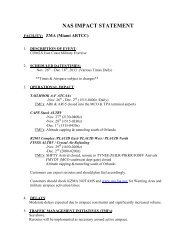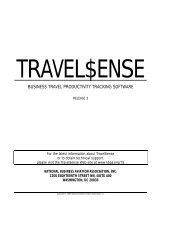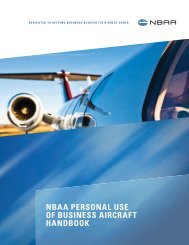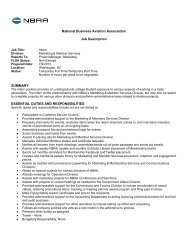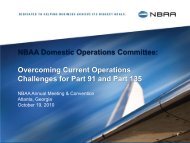2006 NBAA Annual Report
2006 NBAA Annual Report
2006 NBAA Annual Report
Create successful ePaper yourself
Turn your PDF publications into a flip-book with our unique Google optimized e-Paper software.
ADVOCATING FOR THE INDUSTRY IN THE FEDERAL POLICY ARENAIn <strong>2006</strong>, the general aviation community remained under continuedthreat in the federal policy arena over proposals to dramaticallyrestructure funding and governance for the national air transportationsystem.The FAA’s reauthorization process, which is scheduled to concludein late 2007, is being viewed by some as an opportunity to proposean overhaul in the way the FAA is funded and who makes decisionsabout the aviation system.The Air Transport Association (ATA), the lobbying group for thecommercial airlines, introduced a proposal in March of this year thatwould unload $2 billion of their costs onto general aviation byshifting to an FAA funding mechanism that would impose user feeson everyone, including general aviation.The proposal, designed to let the airlines pay less to use the aviationsystem, while exerting more control over it, would be calamitousto general aviation, including companies that rely on business aviationto help them succeed.For instance, the airlines’ user fee plan gives no regard to aircraftweight, so an A-380, for example, would pay the same amount tooperate in the aviation system as a general aviation aircraft. Bysome estimates, the airlines’ plan could cost each operator of turbinepoweredaircraft more than $100,000 per aircraft, per year.Of course, those figures don’t take into account the hiddenadministrative cost that would certainly accompany the user feesystem the airlines envision. The International Air TransportAssociation has estimated that its airlines pay an administrativecost of up to $125 to process each user fee invoice. Certainly, theadministrative burden will be far greater on companies that are notin the business of air transport.Especially unsettling is the airlines’ plan to exert more control overthe aviation system. Congress ensures that the many prioritiesinvolved for the aviation system (including those for general aviation)are given equal consideration. The oversight role of Congress inaviation policymaking must be preserved.<strong>NBAA</strong> has taken action to forcefully oppose the airlines’ plan.Shortly after the ATA introduced its proposal, <strong>NBAA</strong> President andCEO Ed Bolen sent a letterurging <strong>NBAA</strong> Members touse <strong>NBAA</strong>’s online “ContactCongress” resource tomake Congress aware ofthe industry’s opposition tothe plan. Independentlyand with other generalaviation associations,<strong>NBAA</strong> has conducted news events to raiseawareness about the issue through themedia. Bolen has authored severalopinion pieces opposing the airlines’proposal, and reiterating the businessaviation community’s plan for strengtheningthe aviation system. Bolen has alsoappeared opposite representatives from theairlines in a number of panel discussion forums torepresent <strong>NBAA</strong> Members.In each of these venues, <strong>NBAA</strong> also has articulated theAssociation’s guiding principles for the FAA reauthorization process.Specifically:• <strong>NBAA</strong> supports transitioning to a future air transportation systemthat is more satellite-based than today’s ground-based navigationsystem.• <strong>NBAA</strong> supports an increase in the General Fund contribution, to25 percent of FAA funding, to support development of the NextGeneration Air Transportation System.• <strong>NBAA</strong> believes that fuel taxes, which the general aviation communitypays for its use of the national air transportation system,should remain the payment mechanism for general aviation.• <strong>NBAA</strong> opposes user fees for general aviation, because they arecostly and require a large bureaucracy to administer. They alsoare confusing and time-consuming to process, ripe for dispute andeconomically detrimental to the general aviation community.• <strong>NBAA</strong> believes Congress should continue to have authority overFAA funding and other aviation issues.Like the rest of the aviation community, general aviation has a vitalinterest in keeping the national aviation system strong. <strong>NBAA</strong> hasbeen promoting an open discussion about the future needs andoptions for funding the FAA.But given the push in Washington for proposals that could doserious harm to general aviation, <strong>NBAA</strong> will continue representingthe industry in Washington, and urging Association Members tonotify their elected officials of their opposition to any user fee plan.Through the combined efforts of <strong>NBAA</strong>’s professional staff inWashington, and the Association’s Member Companies, <strong>NBAA</strong>hopes to defeat interests that are at odds with the tens of thousandsof businesses that rely upon general aviation.4 <strong>2006</strong> <strong>NBAA</strong> ANNUAL REPORT


